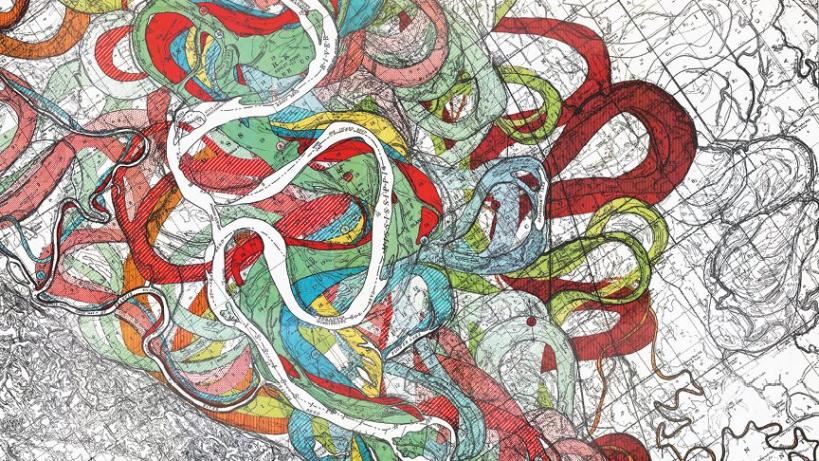Contact
For further questions or information, please contact curriculum@hkw.de (for international and non-Louisiana US-based applicants) or anthropocene@tulane.edu (for participants based in Louisiana/New Orleans).
Deadline May 15, 2019
Our project Mississippi. An Anthropocene River, with Haus der Kulturen der Welt, reaches its climax with the Anthropocene River Campus in the delta of New Orleans (Nov 10–16, 2019). The campus is a one-week educational event within the framework of Mississippi. An Anthropocene River project in collaboration with the New Orleans Center for the Gulf South, Tulane University. The campus offers young artists and scientists opportunities for interdisciplinary discussions about local and global interactions between humans and ecosystems.
Why the Mississippi River Region?
The Mississippi River region presents a rich example for understanding how vast abstractions, such as the Anthropocene, land in the everyday lives of those affected by them. The flows of people, commercial goods, toxins, material extractions, and histories that the river draws together demonstrate the interdependence of ways of life, the environment, and the sociopolitical realities that have come to form its path through the American continent. The river therefore serves as an ideal setting to investigate what the Anthropocene means on the level of experience by framing large-scale ecological changes as they are manifested locally.
Field-oriented Explorations of Anthropocenic Transformations: An Anthropocene River Journey
The objective of the project "Mississippi. An Anthropocene River" is to make this landscape legible through field-oriented explorations of anthropocenic transformations. It unpacks the sources of and impacts on the distinctive ecologies and social realities at the regional level—utilizing five Anthropocene River Field Stations located along the river from Minneapolis to New Orleans. During the fall of 2019, an Anthropocene River Journey will travel the length of the river, from the headwaters to the Gulf of Mexico, in order to collect results and create meaningful engagement with local communities in a broad range of programs both on-site and online. Within these activities, scholars from many fields, along with experts, artists, and activists, are working to develop transdisciplinary practices that can speak to the multifaceted nature of the problems faced en route and the many vernaculars through which the Anthropocene is expressed.

Anthropocene River Campus (November 10–16, 2019)
The project will culminate in an Anthropocene River Campus, which will take place in New Orleans (November 10–16, 2019). The campus will bring together the field research and practices developed over the course of the year and synthesize the findings of the Field Stations to identify the common themes that have emerged. These common themes will form the basis for six seminars around which the campus will be structured. The aim is to unfold key themes—ranging from the flow of commodities, river engineering, and risk and equity to clashing Anthropocene temporalities, claims to property and access, and the stark reality of spiritual and material exhaustion—and investigate how they are expressed locally in and around the delta. Each participant will be asked to participate in two seminars.
Members from the Field Stations, local scholars, and activists, as well as international experts will develop and convene these seminars exploring novel, collaborative, and exploratory epistemological practices and modes of acting upon the urgencies of the Anthropocene.
Applicants should be strongly committed to inter- and transdisciplinary collaboration and demonstrate a broad interest in Anthropocene-related research fields ranging from river studies, geography, geo- and climate sciences, environmental studies, history, and anthropology, to design, landscape architecture, and the arts. Active participation is expected, including the months preceding and following the actual campus week.
This call addresses researchers from a wide range of backgrounds in the sciences, humanities, engineering, design and the arts. From within academia, the call addresses all levels ranging from final-year master’s degree candidates, graduates, PhD students, postdoctoral candidates to tenure and tenure-track faculty. Artists, actors, and activists from civil society, the arts, and politics (e.g., think tanks, NGOs, etc.) are strongly encouraged to apply as well.
Applications can be submitted until May 15, 2019. using this online application form. Applicants are asked to hand in a CV, a brief description of their interest in the Anthropocene and the Mississippi. An Anthropocene River project in particular, and share how they learned about the project. Acceptance letters will be sent out by June 3, 2019.
The registration fee is 150 US dollars. Participants are expected to procure their own funding. For those without access to institutional funding, a limited number of need-based grants can be provided. Please indicate and specify your necessity on the application form.